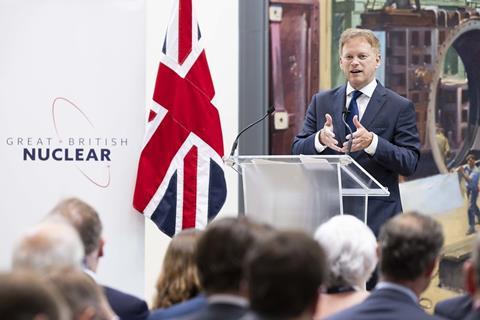New nuclear body launches with total of £157m in new grant funding
The government has invited the developers of mini nuclear reactors to participate in a competition to win new funding for their schemes.
Energy security secretary Grant Shapps announced the competition at the launch of Great British Nuclear (GBN), the new body tasked with delivering the UK’s atomic energy commitments, at London’s Science Museum yesterday.

The Department for Energy Security and Net Zero (DESNZ) hopes the scheme will result in billions of pounds of public and private investment pouring into the nascent small modular reactor (SMR) industry.
Unlike conventional reactors that are constructed on-site with many custom-built components, SMRs are smaller and, in theory, quicker and cheaper to build.
While the nuclear technology itself is well-established, the use of miniature nuclear reactors as the basis of a commercially viable power plant is relatively unproven, with few currently in operation around the world.
The DESNZ has bet big the technology in the hopes that it will help the government meet its commitment to provide a quarter of the UK electricity from nuclear energy by 2050.
SMR companies are likely to benefit from a significant chunk of the £157m in new grant funding announced by Shapps yesterday.
The energy security secretary told the Financial Times that he wanted a shortlist of finalists in the SMR competition by the autumn but admitted that the technology would not come online in the UK until the 2030s.
How the £157m breaks down
- Up to £77m funding for companies to accelerate advanced nuclear business development and support advanced nuclear designs to enter UK regulation
- Up to £58m funding for the further development of three advance modular reactor projects – a type of reactor that operates at a higher temperature than SMRs and could therefore provide heat for hydrogen and other industrial uses
- £22m from the Nuclear Fueld Fund to enable eight projects to develop new fuel production and manufacturing capabilities in the UK
Shapps told the newspaper that engineering firm Rolls-Royce would be “obviously in a good position” to build the UK’s reactors – having received £210m in government funding already – but that up to four different technologies could be selected.
In a statement, Shapps celebrated Britain’s “rich history as a pioneer of nuclear power” and said the competition launch showed “the first brushstrokes of our nuclear power renaissance”.
Alan Sinclair, director of UK natural resources at Turner and Townsend, said the success of GBN would rely on its ability to attract investment, spur innovation and build skills.
>> Rolls Royce mini nuclear reactor designs take step toward approval
>> Plans to build eight new nuclear plants announced in government energy strategy
“Lack of certainty has dogged the sector for over a decade and both investors and the supply chain are looking for a clear break from the past,” he said.
“Get it right and the UK has the potential to tackle emissions and energy independence, while also establishing the foundations for a world-class industry with expertise that can be exported abroad.”
He added that the money dedicated to SMRs could “kick-start” the private investment that the sector needs and “galvanise not just operators, but also the supply chain required to build and manage these new sites”.
“SMRs bring a greater opportunity for off-site design and construction, and a reduced reliance on supporting infrastructure on a massive scale,” he said.
“However, shaping the supply chain to support these changes in the UK’s approach will take time and careful capacity planning.”
Balfour Beatty chief executive Leo Quinn said: “Great British Nuclear represents a gear change in how we power the country’s homes and businesses. Nuclear energy is a clear and proven route to secure clean, homegrown energy – removing the reliance on costly imports.”
Not everyone is enthused, however. Dr Doug Parr, Greenpeace UK’s chief scientists, said that SMRs had “no track record” and that “initial indications are that the familiar problems of cost overruns and delays will be repeated”.
“By continually obsessing about nuclear, the government is taking its eye off the net zero ball, which will have to be delivered through a predominantly renewable, modern electricity grid,” he said.
“No number of SMRs will fix the government’s lacklustre effort to address issues of delayed connections, smart local grids and home efficiency.”



























No comments yet